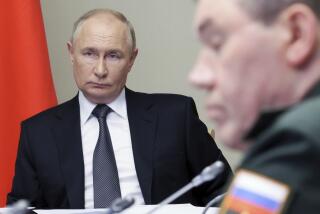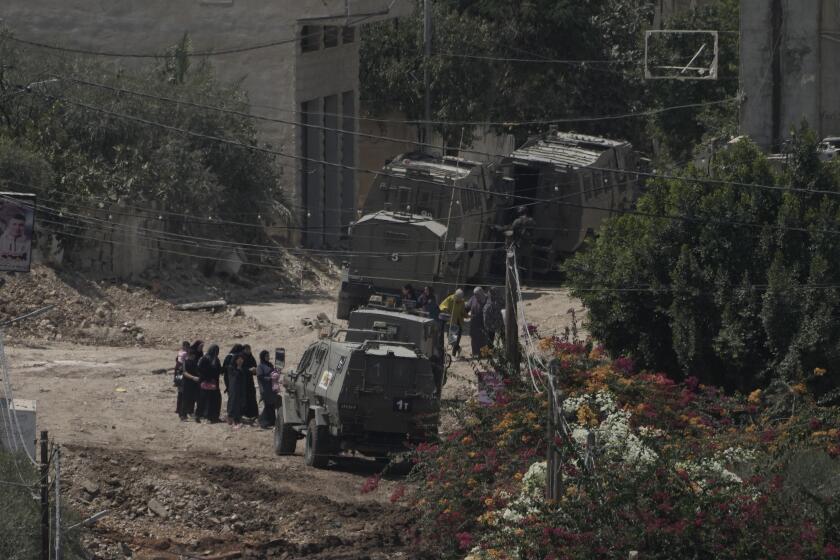Soviets, Iranians Await Signal From Iraq Before Putting Peace Proposals on Table
Iranian and Soviet officials said Tuesday they are awaiting a “signal” from Iraqi President Saddam Hussein that he is ready for peace before moving ahead with proposals to mediate a peaceful end to the Persian Gulf War.
But Soviet diplomats said their experience thus far--a steadfast refusal by Hussein to consider any compromise--offers little encouragement for any negotiations soon.
Iran’s deputy representative at the United Nations, Mohammed Javad Zarif, said his government has sent “ideas” to Baghdad but will not formulate a specific peace proposal unless Iraq says it is ready to withdraw its troops from Kuwait--a demand Hussein has repeatedly rejected.
“We certainly need a signal from the Iraqi side that it is ready to withdraw and that it is ready to go for a peaceful solution in order to be able to formulate our position on this issue,” Zarif told reporters.
“We require a signal that we can go ahead, and at that stage we will formulate our ideas,” he said.
At the same time, a Soviet diplomat here said his government has also decided that no peace initiative can work until Hussein says he is ready to deal.
“Baghdad has shown no flexibility,” the Soviet diplomat said. “Without movement on the Iraqi side, there can’t be any initiative from our side.”
He noted that the Soviet Union has made several appeals to Iraq without results.
“At this point, there is no Soviet special initiative,” he said.
Iranian President Hashemi Rafsanjani, who sent Hussein a letter on Monday offering to mediate an end to the war, said Tuesday that he was awaiting a response. “I hope to receive an encouraging reply so that we can liberate Kuwait and halt further destruction of the Islamic world’s resources,” Rafsanjani said, according to a broadcast of Iran’s government-run radio network.
Both the Soviet Union and neighboring Turkey dispatched special envoys to Tehran to follow up on the Iranian proposals. Soviet Deputy Foreign Minister Alexander M. Belonogov arrived in the Iranian capital Tuesday, and Turkish Foreign Minister Ahmet Kurtcebe Alptemocin is scheduled to arrive today.
The Soviet official here said Belonogov is primarily “on an informational mission” to learn what the Iranian government was doing, adding that a joint Soviet-Iranian initiative appeared unlikely.
The Bush Administration has offered restrained praise to both Iran and the Soviet Union for their mediation attempts--but U.S. officials are quick to add that none of the peace proposals will get anywhere unless Iraq withdraws from Kuwait as a first step.
President Bush, in a news conference Tuesday, said he has “no problem” with Rafsanjani’s mediation offer and even added some pointed compliments for the Tehran government. The United States has had no direct relations with Iran since 1979, when Iranian militants seized the U.S. Embassy in Tehran.
“The fact that Iran would like to see the war end is encouraging,” Bush said. “Iran is conducting itself, in my view, in a very credible way.”
But “I don’t think there is an Iranian proposal,” Bush said--a point Iranian officials readily confirmed.
Both Iran and the Soviet Union have reaffirmed that they seek an early Iraqi withdrawal. Iran’s Zarif, who met Tuesday with U.N. Secretary General Javier Perez de Cuellar, said any future Iranian proposal “would certainly be based on the principles that Iraq’s occupation of Kuwait is dangerous and the presence of foreign forces in the region is dangerous.”
At least five attempts have been made to negotiate a peaceful settlement since Iraq’s invasion of Kuwait on Aug. 2, but all have foundered on Hussein’s refusal to withdraw. Before U.S.-led troops attacked Iraq on Jan. 17, Algeria, France and Perez de Cuellar attempted to work out a compromise settlement. Since the invasion, the Soviet Union and a five-nation group of North African countries have also sought a solution, to no avail.
“I blame Saddam Hussein,” the Soviet diplomat said, noting that his government made two separate mediation offers in January alone.
“The last time we asked, the answer was on TV,” he said--a fiery speech by Hussein denouncing the United Nations and vowing to hold Kuwait forever.
More to Read
Sign up for Essential California
The most important California stories and recommendations in your inbox every morning.
You may occasionally receive promotional content from the Los Angeles Times.







